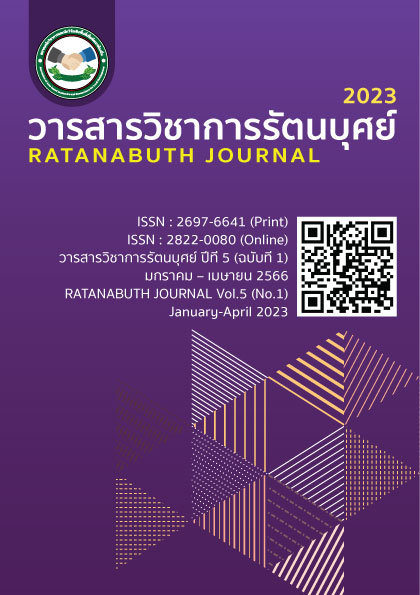The ethical leadership of school administrators that affects the organization's affiliation. Loei Primary Educational Service Area Office 2 The ethical leadership of school administrators that affects the organization's affiliation. Loei Primary Educational Service Area Office 2
Main Article Content
Abstract
The school is one of the most important organizations in education management in Thailand. Success in educational management is possible because of the teacher as an important component. In its main role in teaching and learning, it is a driving force to achieve the goal of effective education management. The quality of education is therefore the result of the quality of teachers who willingly pursue their careers. It is related to the factors of engagement to manage the organization successfully so it depends on the executive model and the most important executive style that makes personnel engagement in the organization is an executive with ethical leadership is very important in the educational organization because the most important duty of an educational administrator is to have ethics in school management. The objectives of this research are 1) to study the level of ethical leadership of school administrators, affiliated with Loei Primary Educational Service Area Office2, 2) to study the level of engagement with teachers' organizations. It is affiliated with Loei Primary Educational Service Area Office2 3) To study the relationship between the ethical leadership of school administrators and the teacher's organizational affiliation. It is affiliated with Loei Primary Educational Service Area Office2 4) To study the ethical leadership of school administrators that affects teachers' organizational engagement. It is affiliated with Loei Primary Educational Service Area Office 2 and 5) to create an affiliation equation for teachers' organizations. It is affiliated with Loei Primary Educational Service Area Office2 Samplers of research are school administrators and teachers, affiliated with Loei Primary Educational Service Area Office2, 2022, 400 students, the accuracy of both individual and individual questionnaires was found to be between 0.859-0.976. Find percentages, averages, and standard deviations. Statistics used to test hypotheses include Pearson's correlation coefficient determination and multiple regression analysis.
The results showed that 1) Ethical leadership of school administrators, affiliated with Loei Primary Educational Service Area Office2, as a whole and on all sides, is at a very high level. 2) Affiliation with the organization of teachers It is affiliated with the Loei Primary Educational Service Area Office2 as a whole is at the highest level, and the side is at the highest level. 3) Ethical leadership of school administrators, affiliated with Loei Primary Educational Service Area Office2, as a whole, has a positive correlation with the teacher's organization. It is statistically significantly high (r=.693) at the .01 level. 4) Ethical leadership of school administrators consists of respect and respect. Governance engagement and Trust It affects the teacher’s engagement with the organization. It is affiliated with Loei Primary Educational Service Area Office 2 was statistically significant at .01 with a predictive efficiency of 49.10 percent
Article Details

This work is licensed under a Creative Commons Attribution-NonCommercial-NoDerivatives 4.0 International License.
References
กมลทิพย์ ทองกำแหง. (2554). กลยุทธ์การพัฒนาภาวะผู้นำเชิงจริยธรรมสำหรับผู้บริหารโรงเรียนเอกชน. วิทยานิพนธ์ครุศาสตรดุษฎีบัณฑิต สาขาวิชานโยบาย การจัดการและความเป็นผู้นำทางการศึกษา บัณฑิตวิทยาลัย จุฬาลงกรณ์มหาวิทยาลัย.
กัณฐิกา สุระโครต. (2559). ความผูกพันต่อองค์การของข้าราชการครูโรงเรียนขนาดกลางในอำเภอแก่งหางแมว สังกัดสำนักงานเขตพื้นที่การศึกษาประถมศึกษาจันทบุรี เขต 1. วิทยานิพนธ์ครุศาสตรมหาบัณฑิต สาขาวิชาการบริหารการศึกษา บัณฑิตวิทยาลัย มหาวิทยาลัยบูรพา.
จิระวัฒน์ ตันสกุล. (2558). การพัฒนาโมเดลการวัดและโมเดลสมการเชิงโครงสร้างพหุระดับความผูกพันของครู. วิทยานิพนธ์ครุศาสตรดุษฎีบัณฑิต สาขาวิชาการวัดและประเมินผลการศึกษา บัณฑิตวิทยาลัย จุฬาลงกรณ์มหาวิทยาลัย.
จิรพล ภูขมัง. (2565). ภาวะผู้นำเชิงจริยธรรมของผู้บริหารสถานศึกษาที่ส่งผลต่อความผูกพันในองค์กรของครูในโรงเรียนในสังกัดสำนักงานเขตพื้นที่การศึกษาประถมศึกษาสกลนคร เขต 3. วิทยานิพนธ์ครุศาสตรมหาบัณฑิต สาขาวิชาการบริหารการศึกษา บัณฑิตวิทยาลัย มหาวิทยาลัยราชภัฏสกลนคร
เฉลิมชัย กิตติศักดิ์นาวิน. (2552). ความไว้วางใจในองค์การของประเทศไทย ศึกษาเปรียบเทียบองค์การภาครัฐ ภาครัฐวิสาหกิจและภาคเอกชน. วิทยานิพนธ์ปรัชญาดุษฎีบัณฑิต สาขาวิชารัฐประศาสนศาสตร์ บัณฑิตวิทยาลัย มหาวิทยาลัยรามคำแหง.
ชุติมา รักษ์บางแหลม. (2559). วิเคราะห์องค์ประกอบภาวะผู้นำเชิงจริยธรรม และประเด็นปัญหาจริยธรรมในการบริหารสถานศึกษาของผู้บริหารวิทยาลัยพยาบาล สังกัดสถาบันพระบรมราชชนก กระทรวงสาธารณสุข. วิทยานิพนธ์ปริญญาศึกษาศาสตรดุษฎีบัณฑิต สาขาวิชาการบริหารการศึกษา บัณฑิตวิทยาลัย มหาวิทยาลัยสงขลานครินทร์.
เชษฐา ทองยิ่ง. (2559). ปัญหาครู ปัญหาที่รอการปฏิรูป. กรุงเทพฯ: สำนักวิชาการ สำนักงานเลขาธิการสภาผู้แทนราษฎร.
ญาดา สามารถ. (2558). รูปแบบภาวะผู้นำที่ส่งผลต่อความผูกพันต่อองค์กรของเจนเนอเรชันเอ็กซ์และเจนเนอเรชันวาย. วิทยานิพนธ์บริหารธุรกิจมหาบัณฑิต สาขาวิชาบริหารธุรกิจ บัณฑิตวิทยาลัย จุฬาลงกรณ์มหาวิทยาลัย.
ณัทพล โตบารมีกุล. (2555). ปัจจัยด้านคุณภาพชีวิตการทำงานที่ส่งผลต่อความผูกพันต่อองค์การของพนักงานธนาคารธนชาต สังกัดสำนักงานภาคกลาง 3.วิทยานิพนธ์ศึกษาศาสตรมหาบัณฑิต สาขาวิชาพัฒนศึกษา บัณฑิตวิทยาลัยมหาวิทยาลัยศิลปากร.
ดวงทิพา พุ่มไม้. (2557). การศึกษาสภาพและแนวทางการพัฒนาภาวะผู้นำเชิงจริยธรรมของผู้บริหารสถานศึกษาสังกัดองค์การปกครองส่วนท้องถิ่นจังหวัดสุโขทัย. วิทยานิพนธ์ครุศาสตรมหาบัณฑิต สาขาวิชาการบริหารการศึกษา บัณฑิตวิทยาลัย มหาวิทยาลัยราชภัฏพิบูลสงคราม.
ธนพร ธรรมโชติ. (2555). ปัจจัยด้านการบริหารแบบมีส่วนร่วมที่มีผลต่อความผูกพันต่อองค์กร ของบุคลากร มหาวิทยาลัยพะเยา. การศึกษาค้นคว้าด้วยตนเองบริหารธุรกิจมหาบัณฑิต สาขาวิชาบริหารธุรกิจ บัณฑิตวิทยาลัย มหาวิทยาลัยพะเยา.
ประชุม บำรุงจิตร์. (2551). ความสัมพันธ์ระหว่างการมีส่วนร่วมในการบริหารงานวิชาการ กับความผูกพันต่อโรงเรียนของครู สังกัดสำนักงานเขตพื้นที่การศึกษานครนายก.วิทยานิพนธ์ครุศาสตรมหาบัณฑิต สาขาวิชาบริหารการศึกษา บัณฑิตวิทยาลัย มหาวิทยาลัยราชภัฏพระนครศรีอยุธยา.
ผาสุก สุมามาลย์กุล. (2560). กลยุทธ์การบริหารโรงเรียนเอกชนตามแนวคิดองค์การที่สร้างความผูกพันของครูและนักเรียน. วิทยานิพนธ์ครุศาสตรดุษฎีบัณฑิต สาขาวิชาบริหารการศึกษา บัณฑิตวิทยาลัย จุฬาลงกรณ์มหาวิทยาลัย.
พระมหาประสงค์ แสงอุ่น. (2557). ภาวะผู้นำเชิงจริยธรรมของผู้บังคับบัญชาที่ส่งผลต่อความผูกพันต่อองค์กรของข้าราชการในเขตกรุงเทพมหานคร. การค้นคว้าอิสระบริหารธุรกิจมหาบัณฑิต สาขาวิชาการบริหารธุรกิจ บัณฑิตวิทยาลัย มหาวิทยาลัยกรุงเทพ.
พิเชษฐ์ ผุงเพิ่มตระกูล. (2554). ความไว้วางใจในผู้บังคับบัญชา ความไว้วางใจในองค์การ ความพึงพอใจในการทำงาน และความผูกพันในองค์การของบุคลากรทางการศึกษามหาวิทยาลัยเทคโนโลยีราชมงคลรัตนโกสินทร์. วิทยานิพนธ์รัฐประศาสนศาสตรมหาบัณฑิต สาขาวิชารัฐประศาสนศาสตร์ บัณฑิตวิทยาลัย มหาวิทยาลัยศิลปากร.
ยุพา กิจส่งเสริมกุล. (2561, มกราคม-มิถุนายน). ความผูกพันต่อองค์การของครูและผู้บริหารสถานศึกษา สังกัดสำนักงานเขตพื้นที่การศึกษาประถมศึกษาสุพรรณบุรี เขต 2. วารสารศิลปากรศึกษาศาสตร์วิจัย, 10 (1), 321-337.
รัตติกรณ์ จงวิศาล. (2561). จิตวิทยาองค์การ (พิมพ์ครั้งที่ 2). กรุงเทพฯ: โรงพิมพ์แห่งจุฬาลงกรณ์มหาวิทยาลัย.
เลิศชัย สุธรรมานนท์. (2560). กลยุทธ์การบริหารทรัพยากรมนุษย์เพื่อองค์กรยั่งยืน.กรุงเทพฯ: สำนักพิมพ์แห่งจุฬาลงกรณ์มหาวิทยาลัย.
วิลาวรรณ รพีพิศาล. (2554). ความรู้พื้นฐานในการบริหารทรัพยากรมนุษย์การบริหารทรัพยากรมนุษย์. กรุงเทพฯ: วิจิตรหัตถกร.
สลิลทิพ ชูชาติ. (2556). พฤติกรรมเชิงจริยธรรมของผู้บริหารในการบริหารสถานศึกษา สังกัดสำนักงานเขตพื้นที่การศึกษาประถมศึกษากำแพงเพชร เขต 2. วิทยานิพนธ์พุทธศาสตรมหาบัณฑิต สาขาวิชาการบริหารการศึกษา บัณฑิตวิทยาลัย มหาวิทยาลัยมหาจุฬาลงกรณราชวิทยาลัย.
สุเทพ ปาลสาร. (2555). การพัฒนาตัวบ่งชี้ภาวะผู้นำเชิงจริยธรรมของผู้บริหารสถานศึกษา สังกัดสำนักงานคณะกรรมการการศึกษาขั้นพื้นฐาน. วิทยานิพนธ์ปรัชญาดุษฎีบัณฑิต สาขาวิชาการบริหารการศึกษา บัณฑิตวิทยาลัย มหาวิทยาลัยขอนแก่น.
สุธาสินี แม้นญาติ. (2554). โมเดลความสัมพันธ์โครงสร้างปัจจัยที่ส่งผลต่อภาวะผู้นำเชิงจริยธรรมของผู้บริหารสถานศึกษา สังกัดกรมส่งเสริมการปกครองท้องถิ่น. วิทยานิพนธ์ปรัชญาดุษฎีบัณฑิต สาขาวิชาการบริหารการศึกษา มหาวิทยาลัยขอนแก่น.
สุนทร เขียวทรัพย์. (2552). ความผูกพันของครูที่มีต่อสถานศึกษา สังกัดเทศบาลนครปฐม.วิทยานิพนธ์ครุศาสตรมหาบัณฑิต สาขาวิชาการบริหารการศึกษา บัณฑิตวิทยาลัย มหาวิทยาลัยราชภัฏนครปฐม.
สุรัตน์ ไชยชมภู. (2557, เมษายน-กันยายน). ภาวะผู้นำเชิงจริยธรรมในการบริหารสถานศึกษา.วารสารวิชาการบริหารการศึกษา มหาวิทยาลัยบูรพา, 8 (2), 1-15.
สุรีย์พร บุญโชคเจริญศรี. (2557). การศึกษาปัจจัยสภาพแวดล้อมในการทำงาน ลักษณะงาน และผู้บังคับบัญชาที่มีอิทธิพลต่อความผูกพันองค์กรของพนักงานระดับปฏิบัติการในพื้นที่ถนนสีลม กรุงเทพมหานคร. การค้นคว้าอิสระธุรกิจมหาบัณฑิต สาขาวิชาบริหารธุรกิจ มหาวิทยาลัยกรุงเทพ.
Allen, N. J. & Meyer, J. P. (1990, March). The measurement and antecedents of affective continuance and normative commitment to the organizations. Journal of Occupational Psychology, 63 (1), 1-18.
Behery, M. H. (2009). Person/organization job-fitting and affective commitment to the organization: Perspectives from the UAE. Department of Management. International Journal, 16 (2), 179-196.
Kalshoven, K. et al. (2011, February). Ethical leadership at work questionnaire (ELW): Development and validation of a multidimensional measure. The Leadership Quarterly, 22 (1), 51-69.
Martin, T. N. & Hafer, J. C. (1995). Turnover is linked to job involvement and organizational commitment. Journal of Vocational Behavior, 13 (12), 106.
Oza, H. S. (2015, September). Does all dimensions of organizational commitment affect job satisfaction and job performance. International Journal of Research in Commerce & Management, 6 (9), 21-22.
Porter, L. W. et al. (1974, October). Organizational commitment, job satisfaction, and turnover among psychiatric technicians. Journal of Applied Psychology, 59 (5), 603-609
Resick, C. J. et al. (2006, February). A cross-cultural examination of the endorsement of ethical leadership. Journal of Business Ethics, 63 (4), 345-359.


